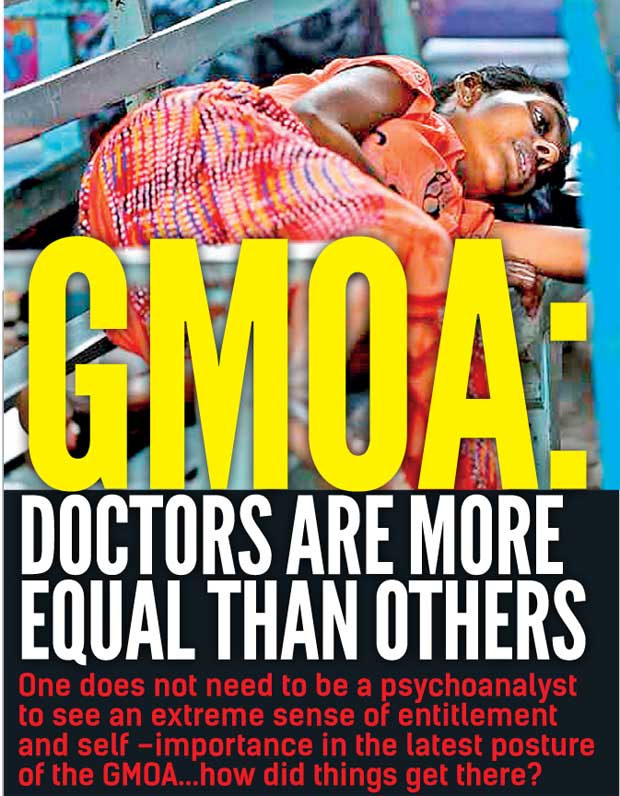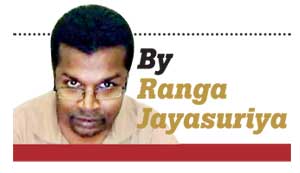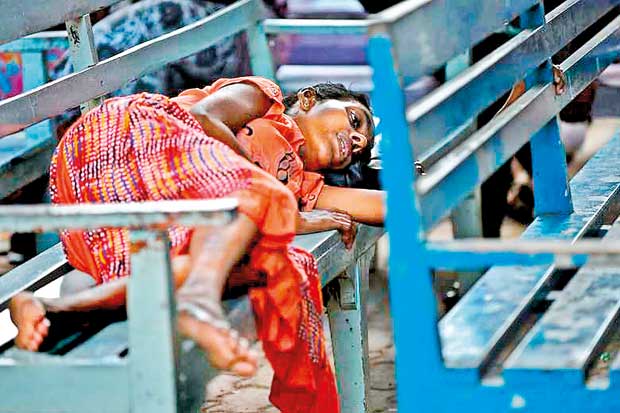Reply To:
Name - Reply Comment
Last Updated : 2024-04-19 16:51:00

 he grade- one school admission is high-stake business. Parents play every magic and trick to get their kids to a good school, and at times in the past, the CID was tasked to investigate forgery and irregularities in the process. It is also an exhausting process; injurious for both physical and financial health. Now the government’s medical doctors have chipped in. The Government Medical Officers’ Association (GMOA) has demanded that the children of its members be given admission to top-notch public schools.
he grade- one school admission is high-stake business. Parents play every magic and trick to get their kids to a good school, and at times in the past, the CID was tasked to investigate forgery and irregularities in the process. It is also an exhausting process; injurious for both physical and financial health. Now the government’s medical doctors have chipped in. The Government Medical Officers’ Association (GMOA) has demanded that the children of its members be given admission to top-notch public schools.
The Government has refused. The aggrieved doctors staged a token strike in several Government hospitals.
The Education Minister has argued that acceding to the GMOA demand would wreak havoc in the established framework on the Grade One school admissions. There is another reason for him to  worry: If he accedes to the GMOA’s demand, there will be many other professional bodies to follow suit.
worry: If he accedes to the GMOA’s demand, there will be many other professional bodies to follow suit.
This would in effect create reservations in the education system for the offspring of the rich and the powerful at the expense of the children of the average folks. That is against the basic premise of the free education policy in this country, which was meant to create equal educational opportunities for all children irrespective of their social and economic backgrounds.
The good doctors were among many millions of others, who benefited from that system. For them to demand special privileges within a system, which serves as a great social equaliser, smacks of a heavy dose of hypocrisy.
One does not need to be a psychoanalyst to see an extreme sense of entitlement and self –importance in the latest posture of the GMOA. But, how did things get there?
There may be many explanations, however one stands out. Various monopolistic conditions nurtured by successive Governments have created an unequal status quo in, which those privileged groups feel they are more equal than others.
They are, of course, entitled to certain privileges by virtue of their very professions and scarcity of their skills, thus the market forces favour them. However, a closer look at their profession would reveal some of that scarcity is self- perpetuated.
Some regulatory mechanisms are scripted to keep competition away, and to limit the number of new entrants into those professions. So, doctors strike when nurses are allowed to take degree level courses; Nurses strike when the midwives are permitted to take educational courses that would challenge former’s sense of professional superiority.
Engineering students fight running battles with the NDT students over the academic recognition of each other’s diploma. Students in State universities protest against deserving students having an education at private universities.
Humans are rational, and by extension, self-seeking. However, the extreme manifestations of cut- throat selfishness in union activism in this country, is made possible by the entrenched monopolistic conditions.

First, in the absence of competition, it makes it easier to blackmail the State. Second, the highly restricted nature of the coteries of elites or the future elites gives them an inflated sense of entitlement. Thus, one could make the most outrageous demand keeping a straight face.
Third, in the absence of competition, what you get in overall is substandard talent and service. Thus monopoly leads to inefficiency, which in turn creates fewer opportunities. When there are fewer opportunities, they tend to have more power and influence concentrated in them. Those who, somehow land in one of those esteemed positions, naturally try to perpetuate that status quo, and implement means and ways that would curtail competition. This is, therefore, a vicious cycle.
This is not a new problem. Take for instance our historical experience. The first three decades since Sri Lanka’s independence is also a period of abysmal economic growth and squandering of the comparative advantages that the country was bestowed at its independence. (Those who cherish those years as the country’s golden years- very few do in fact consider the 70s as good times though-, however overlook that point).
At the independence, our GDP per capita was 80 US$. In 1978, when the economy was finally opened up, it was still US $193. For thirty years, Statist economic policies and a so called middle way, which proved to be a road to nowhere, generated inefficiency, lower growth and misery.
During the same period, countries in East Asia and South East Asia, which followed liberal economic policies recorded phenomenal growth rates, created wealth and modernised their economies. Countries learn from the successful practices of others and emulate them. It is not fair to say that our past leaders did not see the unfolding economic miracles in some parts of the world, which should have proved them the very failure of their own economic policies.
Of course, most of them did not have economic vision or guts of J.R. Jayewardene, who finally unshackled the economy. However, they were also hostages of vested interests of a privileged few, who thrived in the then prevailing monopolistic conditions.
Thus the local industrialists, who were shielded from competition, made a killing by churning out kerosene smelling textiles to the hapless public, who were forced to queue up to buy them.
Sri Lankan economy grew at an annualised rate of a meagre 2.5 per cent during the period of 1970-1977. Monopoly perpetuated misery. Many of those inefficient industries went bankrupt when JR liberalised the economy, but, in a matter of years, competition and liberal reforms helped us export apparel to the Western markets.
Why we failed to climb the manufacturing ladder lately is a different story, but the dismantling of that inefficient closed system paved the way for whatever economic and social opportunities we enjoy today.
Like JR, whose 110th Birth Anniversary fell last Saturday (17) discarded monopoly, dismantled the licence raj of the bureaucracy and unleashed the spirit of the people, the incumbent administration should cut to the size the unduly privileged few, whose excessive self-entitlement comes at the expense of the majority public.
That should be achieved by creating opportunities to the others, and getting rid of regulations that perpetuate monopolistic conditions. However, like the old guard in the 70s did, the new professional elites in the 2000s would fight back to retain their privileges.
That may explain the GMOA’s grouse with the private medical schools. So, it would not be an easy task, yet, one has to begin from somewhere, like JR did some 38 years ago.

Add comment
Comments will be edited (grammar, spelling and slang) and authorized at the discretion of Daily Mirror online. The website also has the right not to publish selected comments.
Reply To:
Name - Reply Comment
On March 26, a couple arriving from Thailand was arrested with 88 live animal
According to villagers from Naula-Moragolla out of 105 families 80 can afford
Is the situation in Sri Lanka so grim that locals harbour hope that they coul
A recent post on social media revealed that three purple-faced langurs near t